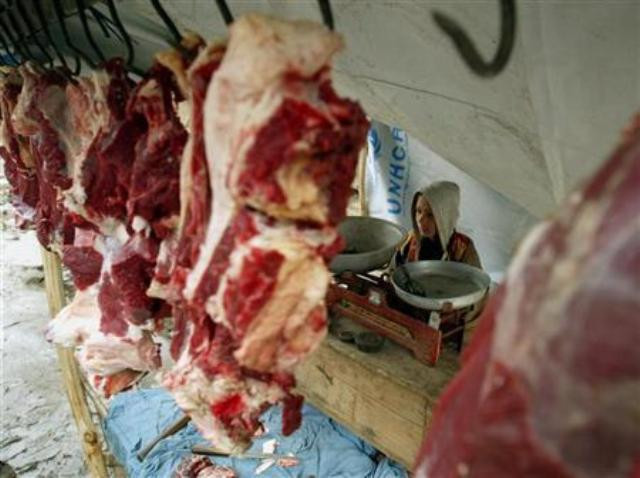Frequent red meat eaters at higher risk of stroke
A new study finds out that eating lots of red meat ups the likelihood of having a stroke while poultry lowers it.

Frequent red meat eaters at higher risk of stroke
"The main message from this paper is that the type of protein or the protein package is really important for the risk of stroke. We have to consider protein in the context of the foods," said Dr. Frank Hu, a professor at the Harvard School of Public Health and one of the authors of the study.
He and his colleagues collected data from two massive health surveys that tracked tens of thousands of men and women from roughly middle age to their senior and elderly years.
Over 20-some years of the study, nearly 1,400 men and more than 2,600 women had a stroke.
Caused by a blood clot or a burst blood vessel that stops blood flow to the brain, stroke is the third most common cause of death in the United States. Twenty-six out of every 1,000 people in the U.S. have experienced a stroke, according to the Centers for Disease Control and Prevention, and about 800,000 die of stroke each year.
To see what influence different types of dietary protein have on stroke risk, the researchers divided up the people in the study based on how much red meat, poultry, fish, dairy and other sources of protein they typically ate each day.
Men who ate more than two servings of red meat each day -- which was at the high end of the meat eaters -- had a 28 percent increased risk of stroke compared to men who averaged about a third of a serving of red meat each day, the low end of the red meat eaters.
The researchers considered a serving of red meat as four to six ounces of beef or a hamburger patty.
Women who ate nearly two servings of red meat a day had a 19 percent higher risk of stroke than women who ate less than half a serving each day.
A 19 percent increase in stroke risk means that instead of 26 out of every 1,000 people having a stroke, 31 out of every 1,000 people would have one.
The researchers also looked at the change in stroke risk that would come with substituting different forms of protein for one daily serving of red meat: swapping in one serving a day of poultry lowered stroke risk by 27 percent, a serving of nuts or fish was linked to a 17 percent drop in risk and a serving of dairy dropped the risk by 10 to 11 percent.
Dr. Adam Bernstein, the lead author of the study and a researcher at the Cleveland Clinic, said he was not surprised to see that red meat eaters suffer more strokes.
"We've also done work on red meat and diabetes and red meat and coronary heart disease. So it makes sense that these cardio-metabolic diseases are grouped together," Bernstein told Reuters Health.
An earlier study, led by Susanna Larsson at the Karolinska Institute in Stockholm, Sweden, also found that eating red meat had a link to stroke risk (see Reuters Health story of December 31, 2010).
What was new in the current study, Larsson said, was that frequent poultry eaters showed a lowered risk of stroke.
People who ate the most chicken or turkey each day -- about a half serving for women and three-quarters of a serving for men -- had a 13 percent reduced risk of stroke compared to those who ate barely more than a serving a day.
One serving was considered four ounces.
"I do not think that poultry has been considered as a protein source that might lower the risk of stroke. This is new," Larsson told Reuters Health in an email.
Also surprising in the study was that fish seemed to offer no protection against stroke.
Larsson pointed out that earlier work has found fewer strokes among groups who eat fish often.
It's possible that the benefits of fish depend on how it's served, Bernstein said.
"There's a lot of variation in how people cook and prepare fish, and we couldn't get down to that level," he said.
The researchers didn't prove that beef is to blame for the increased number of strokes, but Bernstein said it could be that the fat and iron in red meat play a role.
Larsson said the findings support current recommendations to limit how much red meat people eat, and to opt for chicken and fish instead.



















COMMENTS
Comments are moderated and generally will be posted if they are on-topic and not abusive.
For more information, please see our Comments FAQ